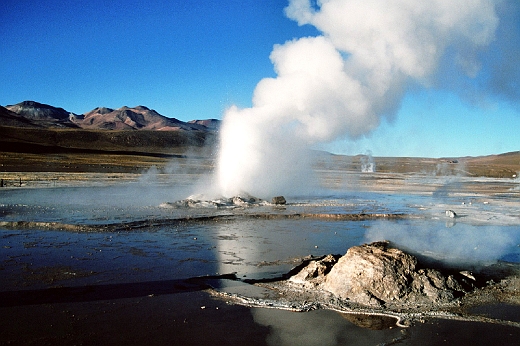Day 5
Santiago, Chile to
San Pedro de Atacama, Chile
February 16th

Today we're leaving Santiago and flying 760 miles into northern Chile to the Atacama where we've never been before. Our hikes this coming week are from the town of San Pedro de Atacama, at an elevation of approximately 8,000 feet. The highest elevation we are to travel is at the Geyser del Tatio at 14,000 feet.
We left for the Santiago Airport early this morning and took a LAN flight to the town of Calama.
We were met at the airport by Daniel Rozas who will be our hiking guide for the next week.
We then drove for an hour and a half to San Pedro de Atacama.

We checked into the lovely La Casa de Don Tomas

where there was a chilled bucket of champagne and two glasses waiting for us!

We checked into the lovely La Casa de Don Tomas
where there was a chilled bucket of champagne and two glasses waiting for us!
For the next week, we'll be exploring the Atacama, the driest non-polar desert on earth. We'll start at San Pedro which is we have been told is "perhaps known as the threshold to enter another world". We are excited to see the strangest, most beautiful landscapes, a source of constant awe that only the Atacama Desert can provide.
Here's some info about the Atacama:
The Atacama Desert is a plateau located primarily in northern Chile. It borders Bolivia and Peru, covering a 600-mile strip of land on the Pacific coast, west of the Andes mountains.
Most of the desert is composed of collapsed stony terrain,

sand

geysers

and lava that flows towards the Andes Mountains.
Geographically, the astounding dryness of the Atacama is explained by it being located between two mountain chains, the Andes Mountains, and the Chilian Coastal Range. These mountain ranges are of such extreme height that they prevent moisture to fall from either the Pacific or the Atlantic Oceans onto the Atacama. This is, in essence, a two-sided rain shadow, preventing the Atacama from receiving life-giving rainwater. Amazingly, there are weather stations here that have never recorded rainfall!
The Atacama is sparsely populated with a few homes located along the Pacific Coast.
However, the interior, oases and some valleys of the Atacama have been populated for millennia. This is the location of the most advanced pre-Columbian societies in Chile!
Incredibly, the Chinchorro culture developed in the Atacama from 7,000 to 15,000 BCE. The Chinchorro were famous for their mummification (and their funeral practices) which predates even Egyptian mummies!
Long before the Inca Empire and centuries before the Spanish arrived, this extremely arid environment was inhabited by the Atacameno tribe (hence the name the Atacama for this area).They were known for building fortified towns called pucaras, one of which is located a few miles from San Pedro de Atacama.
It's impressive to note that even today, the nearest town to San Pedro de Atacama is an hour and a half away!
After we got settled in our hotel room we walked around our "casa".

and set off exploring San Pedro de Atacama.
Summertime is the high tourist season here with the tiny "town" which is comprised of literally 3 streets, is brimming with folks who want to see the Atacama. The great majority of them prefer to ride in vehicles than hiking.
There are quaint shops

along with high-end North Face and Patagonia stores.


We returned to our casa and got ready for our hike first thing tomorrow with our guides Daniel and Mariano.
The Atacama Desert is a plateau located primarily in northern Chile. It borders Bolivia and Peru, covering a 600-mile strip of land on the Pacific coast, west of the Andes mountains.
Most of the desert is composed of collapsed stony terrain,

lithium rich salt lakes
sand

geysers

and lava that flows towards the Andes Mountains.
Geographically, the astounding dryness of the Atacama is explained by it being located between two mountain chains, the Andes Mountains, and the Chilian Coastal Range. These mountain ranges are of such extreme height that they prevent moisture to fall from either the Pacific or the Atlantic Oceans onto the Atacama. This is, in essence, a two-sided rain shadow, preventing the Atacama from receiving life-giving rainwater. Amazingly, there are weather stations here that have never recorded rainfall!
The Atacama is sparsely populated with a few homes located along the Pacific Coast.
However, the interior, oases and some valleys of the Atacama have been populated for millennia. This is the location of the most advanced pre-Columbian societies in Chile!
Incredibly, the Chinchorro culture developed in the Atacama from 7,000 to 15,000 BCE. The Chinchorro were famous for their mummification (and their funeral practices) which predates even Egyptian mummies!
Long before the Inca Empire and centuries before the Spanish arrived, this extremely arid environment was inhabited by the Atacameno tribe (hence the name the Atacama for this area).They were known for building fortified towns called pucaras, one of which is located a few miles from San Pedro de Atacama.
It's impressive to note that even today, the nearest town to San Pedro de Atacama is an hour and a half away!
After we got settled in our hotel room we walked around our "casa".

and set off exploring San Pedro de Atacama.
Summertime is the high tourist season here with the tiny "town" which is comprised of literally 3 streets, is brimming with folks who want to see the Atacama. The great majority of them prefer to ride in vehicles than hiking.
There are quaint shops

along with high-end North Face and Patagonia stores.


We returned to our casa and got ready for our hike first thing tomorrow with our guides Daniel and Mariano.


